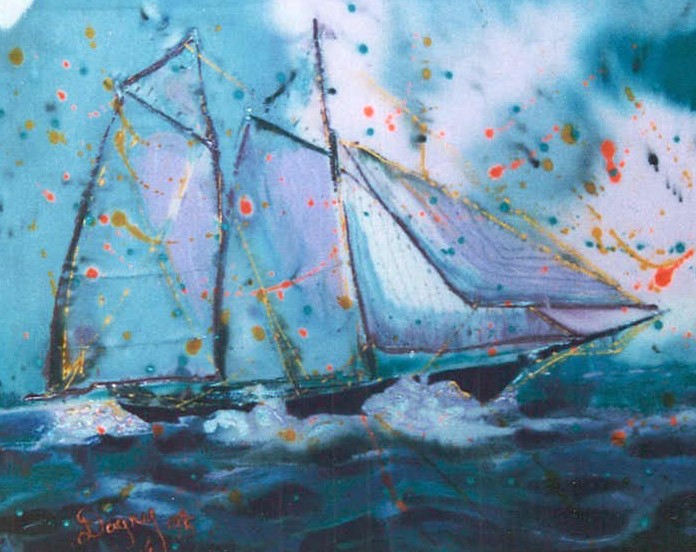Sunday on the beach of Mui Nai near Ha Tien, Vietnam
turned out as interesting as Saturday had been. The overnight rain made the
morning muggy and the beach crowd wasn't as big as on Saturday. Still it was
plenty busy. Late in the morning, we wandered to a restaurant for iced coffee.
We found a seat at a table and started trying to catch the eye of one of the
busy serving people. A woman from another table got up and came over, speaking
to us in French. Fortunately, Dagny speaks French. I can usually get the gist of a conversation in French, but there is a time lag before my understanding kicks in enough for me to nod moronically (since I haven't the vocabulary to respond). That lag is
death to conversation.
As it turned out, the woman was Vietnamese, learned
French in a mission school and had been to France. She got a server to fix us
coffees and chatted away. Then she insisted on paying for our coffees and
disappeared back to a large family group. So that was pleasant. We wandered a
bit more then stopped at another place where we ordered more coffee and then decided
to try some of the street food. We'd
already sampled the dead flat things (DFTs) as I noted in my previous blog, so
we got some spring rolls. These aren't deep fried, and they had mint in them,
along with other veggies and what we suspect was pork. Very delicious. We then
tried some long rolls of glutinous rice wrapped around coconut and sesame buns.
All lovely. The last of these we ate as we walked down the promenade watching
people watch the weird Westerners. One woman acted like she knew us, at least
that is what I assume was meant by her smacking me on the arm and then giggling
when I looked at her. She was an attractive woman, probably in her late 30s and
I'm not sure what was going on, but it went on for a while.
 |
| A spring roll vendor hawking her wares along the promenade |
As we returned to walking down the promenade, we saw a
bright red creature walking the other way, carrying a beer. His hair was copper
colored, but his skin was quite red. That is what happens, apparently, when you
sun bake Finnish skin. His name was Chris and he was excited to speak to
someone who spoke English. So we found a shady table, ordered some beer (Beer 333) and
chatted. He was there with a Finnish friend and his Vietnamese wife, who had a
house in the area. After talking about this and that, we asked Chris if he
thought the Vietnamese wife (Juan) of the other Finn (Marco) could help us
arrange a taxi back to town the next morning, as we hadn't seen a taxi and had
more luggage than I was comfortable with taking on a moto (not that they would
mind). He thought she would, so up the beach we go to find Marco and Juan, and
their extended family.
 |
| Outdoor market in Ha Tien |
The family was just getting ready to leave and wondering
where Chris was anyway. They had rented a minibus for the day and suggested
that we pile in with them and drive down to our hotel where Juan would arrange
things. It was quite a full van, with the 90 year old granny, cousins, uncles,
kids, and assorted foreigners (us). One of the men decided that everyone needed
to have one of the shaved iced treats, so we sat in the van chatting until the
vendor had made one for everyone, including us. We drove to the hotel and, with
Marco speaking Finnish to Chris and Juan, Juan speaking Vietnamese to the hotel
proprietor and Finnish to Marco, and Chris speaking English to us, with the
occasional correction from Marco in Finnish and English, it was accomplished.
| The last view of the Vietnam border before crossing back into Cambodia |
We went back to Ha Tien the next morning, bought pork rolls from a street vendor at the market and then hopped the minibus that crossed the border back into Cambodia, where you can understand the people. The familiar sound of Khmer was sweet to our ears.
All of the border guards and health officials from both countries were great and there were no problems and only minor confusions. However, whenever crossing a border into Cambodia, be sure to have your own pen. You'll need it.









